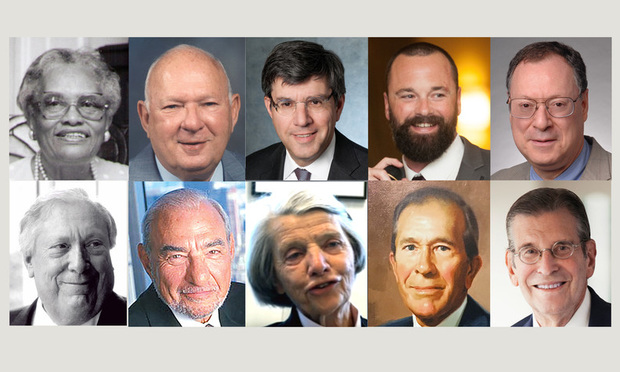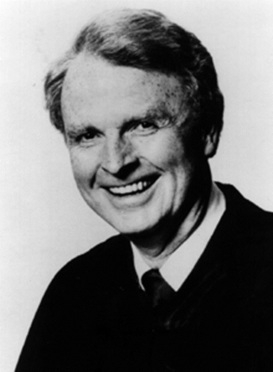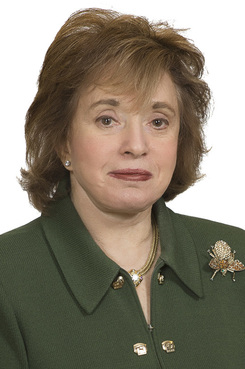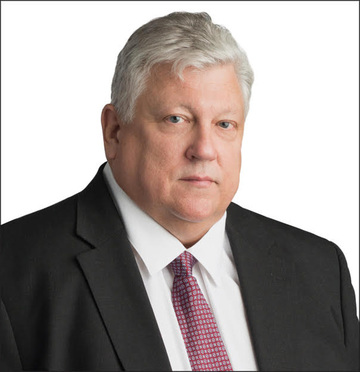In Memoriam: Influential Lawyers, From Pa. and Beyond, We Lost in 2018
Here are some of the prominent faces in the legal industry whose impact helped shape the profession.
December 21, 2018 at 04:14 PM
11 minute read
The original version of this story was published on Law.com
 Top row (L-R): Dovey Johnson Roundtree, Bob Traurig, Gandolfo 'Vince' DeBlasi, Gabriel MacConaill, and Stephen Shapiro. Bottom row(L-R): Judge Stephen Reinhardt, Melvyn Weiss, Christine Beshar, Robert Young, and Stephen Goodman.
Top row (L-R): Dovey Johnson Roundtree, Bob Traurig, Gandolfo 'Vince' DeBlasi, Gabriel MacConaill, and Stephen Shapiro. Bottom row(L-R): Judge Stephen Reinhardt, Melvyn Weiss, Christine Beshar, Robert Young, and Stephen Goodman.
Perhaps now more than ever, the legal profession is in the spotlight for its role in upholding—or, in some cases, defying—the rule of law, as a politically tumultuous year comes to a close. Here we highlight some of the profession's most notable leaders, from the “liberal lion of the federal court” Judge Stephen Reinhardt to Mayer Brown's Stephen Shapiro whose life was tragically cut short, who passed away in 2018.
Christine Beshar
Cravath, Swaine & Moore's first female partner Christine Beshar died at her home in Manhattan in January at age 88. Beshar, who focused on trust and estate law, made partner at the firm in 1977, becoming one of the first female partners on Wall Street. She also worked to establish a child care center at Cravath in 1989, a first for a major New York law firm.
Gandolfo “Vince” DiBlasi
Longtime Sullivan & Cromwell partner Gandolfo “Vince” DiBlasi passed away in January due to complications from pneumonia at age 64. DiBlasi spent four decades at the firm, earning a reputation as a hard-nosed litigator. He was also credited for redefining the Wall Street firm's “white-shoe” reputation, by picking up white-collar defense and investigations work and taking over litigation matters for the firm's financial service industry clients, including The Goldman Sachs Group Inc., which he worked with as its principal litigator for 20 years.
Melvyn Weiss
Plaintiffs bar giant Melvyn Weiss passed away in February the age of 82. Co-founder of the now-defunct Milberg, Weiss, Bershad, Hynes & Lerach, which at one time was the largest plaintiffs firm in the country, Weiss became a securities class action pioneer. But in 2008, he pleaded guilty to racketeering for illegally paying named plaintiffs and was sentenced to 30 months in federal prison.
Judge Stephen Reinhardt
Judge Stephen Reinhardt of the U.S. Court of Appeals for the Ninth Circuit died in March after suffering a heart attack in Los Angeles. The “liberal lion of the federal court” was first nominated to his post in 1979 by President Jimmy Carter and was the sixth-longest serving judge on the Ninth Circuit appeals court. He also presided over a number of high-profile cases, including one challenging California's ban on same-sex marriage.
Stephen Goodman
Longtime Morgan, Lewis & Bockius partner and the “fairy godfather of Philadelphia startups” Stephen Goodman died in March at 77. Goodman began working with early-stage companies, a then neglected area of the law by larger firms, five decades ago when he launched his own firm. Over the years, Goodman worked with promising entrepreneurs throughout Philadelphia and the mid-Atlantic region, and later in Europe, advising clients on strategy and guiding them through all phases of their evolution. He joined Morgan Lewis in 1994, where he founded the firm's emerging business and technology practice.
Stephen J. McEwen Jr.
 Stephen McEwen Jr.
Stephen McEwen Jr.Stephen J. McEwen Jr., a former president judge of the Pennsylvania Superior Court and a two-term district attorney of Delaware County, died at the age of 85 in April. McEwen, who was appointed to the appeals court bench in 1981 by then-Gov. Dick Thornburgh and later elected to a 10-year term, died after a “brief illness,” according to information posted by the D'Anjolell funeral home. McEwen served on the Superior Court for over 30 years, five of those as president judge, retiring from the court in 2012. He served as Delaware County's top prosecutor from 1967 through 1976.
Dovey Johnson Roundtree
Civil rights activist, ordained minister and attorney Dovey Johnson Roundtree died at age 104 in May. During her first year of legal practice in 1952, Roundtree, along with Julius Winfield Robertson, took on the bus desegregation case, Keys v. Carolina Coach, that was used by Attorney General Robert F. Kennedy during the 1961 Freedom Riders' campaign that successfully compelled the Interstate Commerce Commission to end Jim Crow laws in public transportation. Roundtree also broke down the color bar for minority women in the legal community in Washington, D.C., when she was admitted to the all-white Women's Bar of the District of Columbia in 1962. In 1970 she co-founded D.C. law firm Roundtree, Knox, Hunter and Parker and later became general counsel to the National Council of Negro Women.
Robert Traurig
Robert Traurig, one of three lawyers who launched Greenberg Traurig in Miami, passed away at 93 in July. Traurig began his legal career in the 1950s, specializing in administrative law, government relations and real estate litigation. His special knowledge of zoning and development made him the “go-to” attorney for builders in Miami's post-World War II boom. But in 1967, he partnered with Mel Greenberg and Larry J. Hoffman to found Greenberg Traurig, which today employs 1,944 attorneys with $1.48 billion in gross revenue in 2017, placing it 14th on The American Lawyer's 2018 Am Law 200 ranking.
Gregory Harvey
Gregory Harvey, a well-known election and First Amendment law attorney, died in August at the age of 81. Several members of the Philadelphia legal community described Harvey, a longtime Montgomery McCracken Walker & Rhoads lawyer, as a trailblazer in the field of election law, an “encyclopedia” of knowledge about the city's political system and history, and as a friend and mentor. He focused on public election law, First Amendment law and securities litigation, often representing newspapers and publishers. According to his firm bio, his work led to more than 150 reported judicial decisions, and numerous awards including the James Madison Award from the Society of Professional Journalists.
William J. Nealon
U.S. District Senior Judge William J. Nealon of the Middle District of Pennsylvania died at the age of 95 in August, just days after becoming the longest-sitting U.S. district court judge in history. Nealon died Aug. 28, according to a statement from Middle District Chief Judge Christopher Conner. Nealon has served on that court for more than 55 years, since December 1962, when he was appointed by President John F. Kennedy. As of the date of his death, he broke the record of federal Judge Henry Potter, who served on the U.S. District Court for the District of North Carolina from 1802 to 1857. Nealon served as chief judge on the court from 1976 until 1989, when he assumed senior status. Before he was appointed to the Middle District, he was a judge on the Lackawanna County Court of Common Pleas from 1960 to 1962. He worked as a lawyer in private practice from 1951 to 1960. The federal courthouse in Scranton bears his name, the William J. Nealon Federal Building and U.S. Courthouse.
Stephen Shapiro
Stephen Shapiro, a nationally lauded appellate court advocate who launched Mayer Brown's U.S. Supreme Court and appellate practice, died in August after being shot in a domestic-related shooting at his home in northern Chicago. Shapiro first joined Mayer Brown in 1972 and became a partner in 1978. He then left to serve in the Solicitor General's Office, eventually serving as U.S. deputy solicitor general during the Reagan administration. He rejoined the firm in 1983 and started what was possibly the first private practice in Big Law dedicated to arguing before the Supreme Court. Throughout his career, Shapiro argued 30 cases in front of the high court and briefed more than 200.
Robert Young
Robert Young, the former Morgan, Lewis & Bockius chairman who led its transition from a regional firm to a national giant, passed away at 97 in October. When Young became managing partner and chairman of the firm in the 1970s, it had just 125 lawyers in three offices: Philadelphia, Harrisburg and Washington, D.C. Under his tenure, Young paved the way for the law firm's growth to a nearly 2,000 lawyers in 30 offices around the globe.
Gabriel MacConaill
Gabriel MacConaill, a partner in Sidley Austin's Los Angeles office, committed suicide in the parking garage of the firm's downtown Los Angeles office in October. MacConaill first joined the firm in 2009 and became partner in the firm's bankruptcy practice in 2014. Prior to his death, MacConaill represented the likes of American Airlines Inc., Aricent Technologies Holdings Ltd. and GE Capital Retail Bank in bankruptcy court proceeding and was one of several of the firm's attorneys to land a lead role on the Chapter 11 filing by Mattress Firm Inc. Following his passing, MacConaill's widow, Joanna Litt, penned an open letter about her husband's suicide that cast a light on mental health and wellness in the profession.
Lynne Z. Gold-Bikin
 Lynne Z. Gold-Bikin
Lynne Z. Gold-BikinLynne Z. Gold-Bikin, an outspoken authority in Pennsylvania family law, died at the age of 80 in October. Gold-Bikin was a partner at Weber Gallagher Simpson Stapleton Fires & Newby and chair of the firm's family law department, and an actively practicing lawyer until the end of her life. Former colleagues and friends remembered her as a zealous advocate with strong opinions, and a trailblazer for women lawyers and family law. Her death followed a brief bout with multiple myeloma. Gold-Bikin was involved in shaping family law from early in her career, as she was involved in the enactment of the 1980 Divorce Code. In 1994, she published the Divorce Practice Handbook. She served as chair of the American Bar Association's Family Law Section in the 1994-1995 year, and as a mentor in the ABA's diversity program. She previously co-chaired the ABA's Commission on Domestic Violence, and was a member of the ABA's house of delegates and board of governors. She was also a longtime instructor at The National Family Law Trial Institute in Houston and a frequent contributor to The Legal.
George Medved
 George Medved, the lawyer who led the charge for several Philadelphia-based firms to enter the Pittsburgh market, died in November. Medved, who had been a partner in the corporate litigation group at Blank Rome since 2015, died suddenly of a heart attack Nov. 9 at the age of 65. A lifelong Pittsburgher, Medved started his legal career at Pittsburgh-based Eckert Seamans Cherin & Mellott, and later became a name partner at Pittsburgh's Doepken Keevican Weiss & Medved. But from there, he went on to help three large, Philadelphia-based law firms build a presence on the other end of the state. In 1995, he left Doepken Keevican to join Pepper Hamilton, which was just launching its Pittsburgh office. That firm now has over 30 lawyers in Pittsburgh, according to its website. He did the same for Duane Morris in 2003, whose Pittsburgh office is still a dozen lawyers strong, and then for Blank Rome in 2015, which now has 18 lawyers in Pittsburgh.
George Medved, the lawyer who led the charge for several Philadelphia-based firms to enter the Pittsburgh market, died in November. Medved, who had been a partner in the corporate litigation group at Blank Rome since 2015, died suddenly of a heart attack Nov. 9 at the age of 65. A lifelong Pittsburgher, Medved started his legal career at Pittsburgh-based Eckert Seamans Cherin & Mellott, and later became a name partner at Pittsburgh's Doepken Keevican Weiss & Medved. But from there, he went on to help three large, Philadelphia-based law firms build a presence on the other end of the state. In 1995, he left Doepken Keevican to join Pepper Hamilton, which was just launching its Pittsburgh office. That firm now has over 30 lawyers in Pittsburgh, according to its website. He did the same for Duane Morris in 2003, whose Pittsburgh office is still a dozen lawyers strong, and then for Blank Rome in 2015, which now has 18 lawyers in Pittsburgh.
This content has been archived. It is available through our partners, LexisNexis® and Bloomberg Law.
To view this content, please continue to their sites.
Not a Lexis Subscriber?
Subscribe Now
Not a Bloomberg Law Subscriber?
Subscribe Now
NOT FOR REPRINT
© 2025 ALM Global, LLC, All Rights Reserved. Request academic re-use from www.copyright.com. All other uses, submit a request to [email protected]. For more information visit Asset & Logo Licensing.
You Might Like
View All

Trending Stories
- 1Gertrude Stein Is Right On Again
- 2Georgia's Next Judge? Sole Candidate Shortlisted to Rise to Bench
- 3The End of Innocence? DEP’s End Run Around ‘All Appropriate Inquiry’ Spill Act Protections
- 4Pistachio Giant Wonderful Files Trademark Suit Against Canadian Maker of Wonderspread
- 5New York State Authorizes Stand-Alone Business Interruption Insurance Policies
Who Got The Work
J. Brugh Lower of Gibbons has entered an appearance for industrial equipment supplier Devco Corporation in a pending trademark infringement lawsuit. The suit, accusing the defendant of selling knock-off Graco products, was filed Dec. 18 in New Jersey District Court by Rivkin Radler on behalf of Graco Inc. and Graco Minnesota. The case, assigned to U.S. District Judge Zahid N. Quraishi, is 3:24-cv-11294, Graco Inc. et al v. Devco Corporation.
Who Got The Work
Rebecca Maller-Stein and Kent A. Yalowitz of Arnold & Porter Kaye Scholer have entered their appearances for Hanaco Venture Capital and its executives, Lior Prosor and David Frankel, in a pending securities lawsuit. The action, filed on Dec. 24 in New York Southern District Court by Zell, Aron & Co. on behalf of Goldeneye Advisors, accuses the defendants of negligently and fraudulently managing the plaintiff's $1 million investment. The case, assigned to U.S. District Judge Vernon S. Broderick, is 1:24-cv-09918, Goldeneye Advisors, LLC v. Hanaco Venture Capital, Ltd. et al.
Who Got The Work
Attorneys from A&O Shearman has stepped in as defense counsel for Toronto-Dominion Bank and other defendants in a pending securities class action. The suit, filed Dec. 11 in New York Southern District Court by Bleichmar Fonti & Auld, accuses the defendants of concealing the bank's 'pervasive' deficiencies in regards to its compliance with the Bank Secrecy Act and the quality of its anti-money laundering controls. The case, assigned to U.S. District Judge Arun Subramanian, is 1:24-cv-09445, Gonzalez v. The Toronto-Dominion Bank et al.
Who Got The Work
Crown Castle International, a Pennsylvania company providing shared communications infrastructure, has turned to Luke D. Wolf of Gordon Rees Scully Mansukhani to fend off a pending breach-of-contract lawsuit. The court action, filed Nov. 25 in Michigan Eastern District Court by Hooper Hathaway PC on behalf of The Town Residences LLC, accuses Crown Castle of failing to transfer approximately $30,000 in utility payments from T-Mobile in breach of a roof-top lease and assignment agreement. The case, assigned to U.S. District Judge Susan K. Declercq, is 2:24-cv-13131, The Town Residences LLC v. T-Mobile US, Inc. et al.
Who Got The Work
Wilfred P. Coronato and Daniel M. Schwartz of McCarter & English have stepped in as defense counsel to Electrolux Home Products Inc. in a pending product liability lawsuit. The court action, filed Nov. 26 in New York Eastern District Court by Poulos Lopiccolo PC and Nagel Rice LLP on behalf of David Stern, alleges that the defendant's refrigerators’ drawers and shelving repeatedly break and fall apart within months after purchase. The case, assigned to U.S. District Judge Joan M. Azrack, is 2:24-cv-08204, Stern v. Electrolux Home Products, Inc.
Featured Firms
Law Offices of Gary Martin Hays & Associates, P.C.
(470) 294-1674
Law Offices of Mark E. Salomone
(857) 444-6468
Smith & Hassler
(713) 739-1250





